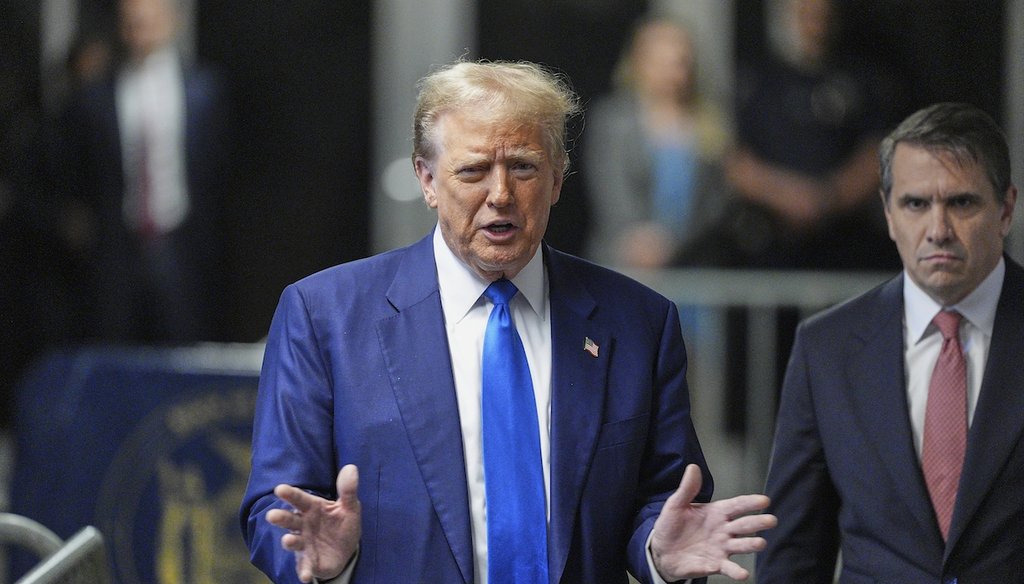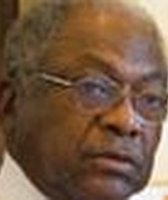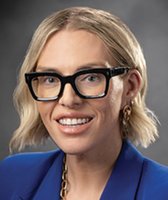Get PolitiFact in your inbox.

Former President Donald Trump arrives May 3, 2024, at Manhattan criminal court in New York. (AP)
If Your Time is short
-
The Federal Election Commission’s general counsel recommended commissioners find wrongdoing by then-President Donald Trump, but the case died after commissioners split on their vote along party lines.
-
U.S. Attorney Geoffrey Berman of New York’s southern district wrote in his book, “Holding the Line,” that the Trump administration interfered in political prosecutions.
-
The case faced numerous delays, including a legal challenge that went to the Supreme Court, before going to trial in an election year.
Former President Donald Trump has repeatedly attacked Manhattan District Attorney Alvin Bragg, saying Bragg brought forward the case against him after other investigative bodies passed.
In remarks to reporters after court May 6, Trump also singled out the actions of the Federal Election Commission and the U.S. attorney’s office in New York’s southern district.
"The FEC said they threw it away," Trump said, referring to the Federal Elections Commission. "They said, ‘You’ve got to be kidding.’ Southern district didn’t bring the case. Nobody brought the case and then Alvin Bragg brought the case."
Trump said Bragg brought the case "when I am running and leading" in the polls. He said, "They all want to keep me off the campaign trail."
Trump omitted the full story about the FEC’s actions. The independent federal agency administers and enforces federal campaign finance law. Six commissioners lead it, no more than half of whom can belong to the same political party.
Trump is charged in Manhattan with 34 counts of falsifying business records in an alleged scheme to cover up a hush money payment to adult film actor Stormy Daniels before the 2016 presidential election. (Daniels’ real name is Stephanie Clifford.)
FEC commissioners split their vote on general counsel’s recommendation
Trump’s statement that the FEC "threw away" the case and replied "you’ve got to be kidding" could be interpreted to mean the agency tossed the case quickly. That’s not what happened. The complaints were filed with the agency early in 2018 and not closed until three years later.
The FEC received complaints against Trump; his lawyer Michael Cohen, who handled the payoff to Daniels; Trump’s campaign; and a few other people and entities.
The complaints alleged that Cohen, Trump and others violated the Federal Election Campaign Act, the federal law regulating political campaign fundraising and spending, at Trump’s direction to influence the 2016 election.
In a 70-page report released in December 2020, the commission’s Office of General Counsel recommended that the commission find there was reason to believe that the contributions were illegal and went unreported.
"The available information indicates that Michael Cohen paid Stephanie Clifford $130,000 … with Trump’s express promise of repayment, for the purpose of influencing the 2016 election" by preventing Clifford from publicizing the allegation, it said.
However, in February 2021, the FEC deadlocked on a 2-2 vote on whether Trump willfully violated federal law. The commission often deadlocks along partisan lines when it considers controversial cases. (In this case, the FEC was down from six commissioners to four. One commissioner, an independent, was absent; and one commissioner, a Republican, opted to recuse.)
The Republican commissioners, Sean J. Cooksey and James E. Trainor III, didn’t address the charges’ validity. They argued Cohen’s guilty plea in federal court made the public record "complete," and that "pursuing these matters further was not the best use of agency resources."
The Democratic commissioners, Shana M. Broussard and Ellen L. Weintraub, argued that the charges against Trump — that he "knowingly and willfully accepted contributions nearly 5,000% over the legal limit to suppress a negative story mere days before Election Day" — were "well-grounded."
Book raises questions about Trump administration pressure on federal prosecutors
In his 2022 book, "Holding the Line," former U.S. Attorney Geoffrey Berman described ways that he said the Trump administration interfered in political prosecutions. Trump appointed Berman to New York’s southern district in 2018. Berman’s office prosecuted Cohen although Berman recused himself.
Berman’s office also investigated Trump lawyer and former New York Mayor Rudy Giuliani. News reports said there were tensions between the prosecutor’s office and the White House in 2020. In June 2020, Attorney General Bill Barr asked Berman to resign and Berman refused, leading Trump to fire him.
Berman wrote that before Cohen pleaded guilty in federal court to charges connected to the Trump hush money case, a Justice Department official "badgered" Berman’s office "without success to remove all references to Individual 1, President Trump, from the charging document."
When Bill Barr took over as attorney general in February 2019, "he not only tried to kill the ongoing investigations, but — incredibly — suggested that Cohen’s conviction on campaign finance charges be reversed," Berman wrote.
Barr summoned a deputy in Berman’s office to challenge the basis of Cohen’s plea and "the reason behind pursuing similar campaign finance charges against other individuals," Berman wrote.
Instructions from Barr and his administration were explicit, Berman wrote: "Not a single investigative step could be taken, not a single document in our possession could be reviewed until the issue was resolved. … It certainly seemed clear that Barr did not want the Cohen case spiraling in new directions."
Another deputy in Berman’s office later persuaded Barr to continue the investigation. It did not result in charges. The New York Times’ article about the book in September 2022 said that spokespersons for Barr and Trump did not immediately respond to a request for comment.
We asked a spokesperson for Trump’s campaign if he had any evidence for us to consider related to the allegations in Berman’s book about pressure from Barr and did not receive a response.
New York investigation into Trump has roots during his presidency
Although Trump criticizes his trial’s timing, he omits numerous factors that caused the case to take years to reach the charging stage.
The Manhattan investigation into Trump began in 2018, during Trump’s presidency. It faced many twists, turns and delays amid the coronavirus pandemic, the 2020 presidential election and prosecutorial turnover.
After Cohen pleaded guilty to federal charges in 2018, then-Manhattan District Attorney Cyrus Vance Jr. began investigating the payments, Politico reported.
Federal prosecutors could not charge Trump then because Justice Department policy bars bringing criminal charges against a sitting president, Politico reported.
After federal prosecutors concluded their investigation, Vance in August 2019 subpoenaed Trump’s personal and corporate tax records. Trump’s lawyers fought the subpoena, and the U.S. Supreme Court in July 2020 ruled in Vance’s favor.
By the time Vance obtained the records, it was February 2021, early in Joe Biden’s presidency. Bragg was elected to replace Vance and took office in January 2022.
The next month, Carey Dunne and Mark Pomerantz, two prosecutors who were heading the investigation into Trump’s business dealings, resigned.
Days later, Bragg’s office said a new prosecutor had been assigned to lead the case.
But even then it wasn’t clear whether Bragg was pursuing the case against Trump. In March 2022, The New York Times published Pomerantz’s resignation letter, in which he told Bragg that he disagreed with his decision not to prosecute Trump and take the case to a grand jury.
Bragg said in an April 7, 2022, statement that the investigation against Trump was continuing. The grand jury indicted Trump in March 2023 and Bragg announced the charges in April 2023.
PolitiFact Senior Correspondent Louis Jacobson contributed to this article.
CORRECTION, May 8, 2024: The Federal Election Commission’s general counsel reviewed complaints, issued a report and recommended the commission find reason to believe that Trump engaged in wrongdoing. An earlier version of this fact-check used less precise terms to describe this process. The story has been updated.
RELATED: Trump says business records case about hush money is a "Biden trial." It’s a Manhattan trial
RELATED: A fact-checker’s guide to Trump’s first criminal trial: business records, hush money and a gag order
RELATED: Read all of PolitiFact’s coverage on Donald Trump indictments
Our Sources
Judge Juan Merchan, Decision and order on people’s motion for contempt, April 30, 2024
Federal Election Commission general counsel, Report, December 2020
Federal Election Commission, Certification, Feb. 23, 2021,
Federal Election Commission, statement by Shana M. Broussard and Ellen L. Weintraub, May 6, 2021
Federal Election Commission, statement by Sean J. Cooksey and James E. Trainor III, April 26. 2021
U.S. Attorney’s Office Southern District of New York, Michael Cohen Pleads Guilty In Manhattan Federal Court To Eight Counts, Including Criminal Tax Evasion And Campaign Finance Violations, Aug. 21, 2018
U.S. Attorney’s Office Southern District of New York, Michael Cohen Sentenced To 3 Years In Prison, Dec. 12, 2018
U.S. News and World Report, The 2024 Battleground Counties: Waukesha County, Wisconsin, April 30, 2024
TIME magazine, Read the Full Transcripts of Donald Trump’s Interviews With TIME, April 30, 2024
C-SPAN, Former President Trump After Opening Statements on Day 5 of Hush Money Trial in New York, April 22, 2024
AP, Michael Cohen ends prison term after Trump-related crimes, Nov. 22, 2021
Geoffrey Berman, Holding the Line, September 2022
Washington Post The Fact Checker, Facts in the Trump courtroom v. ‘facts’ in the court of public opinion, April 23, 2024
New York Times, Fact-Checking Trump’s Remarks in the Hush Money Trial, April 27, 2024
New York Times, New Trump investigation to focus on prosecutions, Sept. 14, 2022
CNN wire, Former US attorney says Trump DOJ pressured office to 'aid them politically,' NYT reports, Sept. 8, 2022
CNN, Geoffrey Berman is leaving office immediately after standoff with Trump administration, June 20, 2020
PolitiFact, Fact-checking Trump on the Stormy Daniels case: The statute of limitations and the FEC's role, March 21, 2023
PolitiFact, Fact-check: Trump misleads on jury selection, request to Judge Merchan for time off, April 17, 2024












































